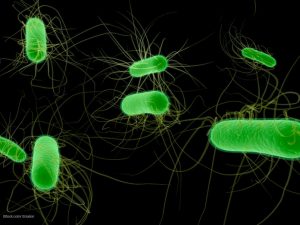The Minnesota Department of Health is investigating two unrelated toxic E. coli outbreaks at the same time — one on the Fond du Lac Reservation involving type O157:H7 and the other involving E. coli O111 at Applebees restaurants.
 In both outbreaks, officials are trying to pinpoint the source of contamination even while victims in the Applebees outbreak have launched an Applebees E. coli lawsuit in U.S. District Court in Minneapolis. The Applebees outbreak was announced July 14 in a press release that alerted customers of the chain who ate there since June 20 to report if they suffered bloody diarrhea or severe diarrhea within days of their meal. Fifteen people have been confirmed as case patients, including four who were hospitalized, but Health Department spokesman Doug Schultz has said 15 was probably just the tip of the iceberg in terms of the number of people who became infected.
In both outbreaks, officials are trying to pinpoint the source of contamination even while victims in the Applebees outbreak have launched an Applebees E. coli lawsuit in U.S. District Court in Minneapolis. The Applebees outbreak was announced July 14 in a press release that alerted customers of the chain who ate there since June 20 to report if they suffered bloody diarrhea or severe diarrhea within days of their meal. Fifteen people have been confirmed as case patients, including four who were hospitalized, but Health Department spokesman Doug Schultz has said 15 was probably just the tip of the iceberg in terms of the number of people who became infected.
A scientific study of menu choices by sick and non-affected Applebees customers has suggested to investigators that cabbage, carrots, greens or possibly nuts could have been carrying E. coli O111. The restaurant company removed Oriental Chicken Salad from its menus and voluntarily switched suppliers of the ingredients.
E. coli lawyer Fred Pritzker, whose firm represents multiple Applebees customers, said the outbreak could have been prevented if growers, suppliers and Applebees had been more vigilant. Once a restaurant puts food on the table, it has a responsibility to make sure it is safe to eat, he said.
Just 7 days after the Applebees E. coli O111 outbreak was announced, the health department this week said E. coli O157:H7 has sickened at least 22 people in the Fond du Lac Band of Lake Superior Chippewa in northeastern Minnesota. The band has alerted its members to discard any food left over from any recent community event. The rash of foodborne illnesses on the reservation involve the most common and feared strain of toxic E. coli.
Type O157:H7 on the reservation and type O111 at Applebees are related to each other by the fact they both emit Shiga toxin, a substance that attacks a person’s red blood cells. Shiga Toxin E. coli (STEC) can cause kidney failure, neurological pathos, heart ailments, vascular injury and death. Children under 5, older adults and people who live with compromised immune systems are the most susceptible to the potentially fatal complication known as E. coli HUS, but the disease can strike anyone, including healthy adults.




